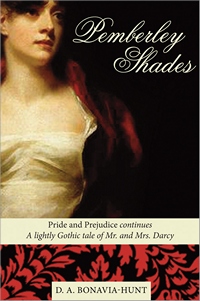This beautiful oil portrait circa 1800 of a lady (Mrs. Walter Learmouth?) is attributed to Sir Henry Raeburn, R.A. (Scottish, 1756-1823). He is one of my favorite artists of the Georgian and Regency era, producing powerful, stark and realistic paintings of his subjects. This portrait of Mrs. Learmouth in a white dress against a dramatic... Continue Reading →
Emma: Mr. Knightley’s Proposal – Marriage or Merger?
"And now, let me talk to you of something else. I have another person's interest at present so much at heart, that I cannot think any longer about Frank Churchill. Ever since I left you this morning, Emma, my mind has been hard at work on one subject." The subject followed; it was in plain,... Continue Reading →
Northanger Abbey Chapters 1-3: Summary, Musings & Discussion: Day 2 Giveaway
No one who had ever seen Catherine Morland in her infancy would have supposed her born to be a heroine. Her situation in life, the character of her father and mother, her own person and disposition, were all equally against her. The Narrator, Chapter 1 Quick Synopsis Catherine Morland the unlikely heroine lives a pretty... Continue Reading →
The Darcys and the Bingleys, by Marsha Altman – A Review
Now they had come to it, the moment he dreaded. "We are to marry in nearly two days -" "It has not escaped my notice, I assure you." "- and I find myself in need of some . . . advice." Mr. Bingley & Mr. Darcy, The Darcys & the Bingleys And so gentle readers,... Continue Reading →
Pemberley Shades: Pride and Prejudice Continues, by D. A. Bonavia-Hunt – A Review
It is with great pleasure that I learned that the classic Pride and Prejudice sequel, Pemberley Shades by Dorothy Alice Bonavia-Hunt, would be re-issued in September by Sourcebooks. Originally published in 1949, it was the second Jane Austen sequel ever to be written and not easily available for purchase unless you were lucky enough to... Continue Reading →
Mansfield Park Chapters 41-48: Summation, Musings & Discussion; Day 14 Give-away!
THE NOVEL Good sense, like hers, will always act when really called upon; and she found that she had been able to name him to her mother, and recall her remembrance of the name, as that of "William's friend," though she could not previously have believed herself capable of uttering a syllable at such a... Continue Reading →
Mansfield Park Chapters 33-40: Summation, Musings & Discussion: Day 12 Give-away!
THE NOVEL He was in love, very much in love; and it was a love which, operating on an active, sanguine spirit, of more warmth than delicacy, made her affection appear of greater consequence because it was withheld, and determined him to have the glory, as well as the felicity, of forcing her to love him.... Continue Reading →
Mansfield Park Chapters 1-8: Summation, Musings & Discussion: Day 2 Give-away
THE NOVEL "Do not let us be frightened from a good deed by a trifle. Give a girl an education, and introduce her properly into the world, and ten to one but she has the means of settling well, without farther expense to anybody." Mrs. Norris, Chapter 1 Quick Synopsis Ten year old poor relation... Continue Reading →
Mansfield Park Madness Introduction: Day 1 Give-away
WELCOME "Depend upon it, you see but half. You see the evil, but you do not see the consolation. There will be little rubs and disappointments everywhere, and we are all apt to expect too much; but then, if one scheme of happiness fails, human nature turns to another; if the first calculation is wrong,... Continue Reading →
Breaking News: Tornado Tom Lefroy Hits Austenland
"At length the day is come on which I am to flirt my last with Tom Lefroy ... My tears flow as I write at the melancholy idea" Jane Austen Letter to Cassandra Austen, 16 January 1796, The Letters of Jane Austen My Dear Miss Austen, Our tears flow too dear Jane. A tornado has hit... Continue Reading →
Jane Austen’s Dearest Friendship with Miss Sharp Still Resonates Today
You would have held the memory of your friend Jane too in tender regret I am sure. - But the Providence of God has restored me - & may I be more fit to appear before him when I am summoned, than I sh'd have been now! - Sick or Well, beleive me ever your... Continue Reading →
My Personal Austen: Does Reading Jane Austen Make Me a Better Person?
If anyone out there has ever wondered where I get my inspiration to write continually about one subject - Jane Austen - for six months and counting, you might be amused at what from time-to-time inspires those brain cells into action. Many times, I will be Googling along and happen upon something that I was not... Continue Reading →











